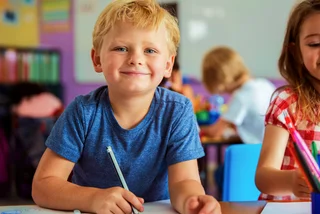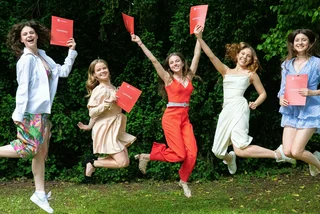Prague British International School has begun the 2021/2022 school year with a new principal. Niki Meehan has extensive school leadership experience, with a career spanning over 25 years and several countries.
Prior to joining PBIS, Niki was principal at Nord Anglia International School Rotterdam but she has also held leadership positions at other Nord Anglia schools including Jakarta, Shanghai, and Bratislava.
We recently spoke to Meehan about the future of international schooling, education in the Covid era, the Nord Anglia difference, and the secret behind her successful approach to building inspirational communities for students, parents, and colleagues.
Your last post was in Rotterdam. How was the Covid situation handled at the school and what lessons did you learn?
We were able to handle Covid well – at an individual school level and with the support that came from being part of the Nord Anglia Education family of schools globally. During this pandemic, all the NAE schools were able to quickly switch to virtual or hybrid models of schooling, with technology-efficient teams supporting that transition. Collectively as an organization, NAE’s expertise is vast, and we were able to work together to share best practices and develop great virtual programs for our students.
Similar to PBIS, in Rotterdam, we had high-quality, skilled, and highly connected staff who proved themselves to be highly resilient. This meant the teachers were attentive to their students’ needs and able to quickly adapt to new ways of teaching. We also worked closely with parents, using their feedback to help shape effective learning models for different phases and communities within the school.
Culturally the Czech Republic is different than the Netherlands, what challenges do you foresee as you make this transition to a new country and new school?
One of the things that always amazes me isn't the differences but the similarities. Globally, children are more similar than different and teachers are all teachers at heart and want to get the best outcomes for their students.
As an international school, we have very diverse student bodies, and international communities of students, parents, and staff. But everyone within our school community is united by being part of our school and being committed to our school values and philosophy."
This makes my leadership transition easier and while every school has its own identity, there are a lot of similarities from Rotterdam to Shangai and Bratislava. That said I am looking forward to learning about Czech culture and history from our local students, staff, and parents’ perspectives as it's exciting for me to get to know new people and cultures.
You mention the school's philosophy. What is that philosophy and what is your own personal philosophy as an education leader?
My philosophy has always been that every child deserves to have teachers who nurture a love of learning and to be excited to come to school every day, knowing that their teachers will take the time to get to know them and help them.
"There are different definitions of what success means and it's no longer just about academic success. So we want students to love learning and to be independent. PBIS takes a holistic approach to each child, placing importance on the development of confidence, creativity, and life skills as well as academic skills, knowledge, and understanding.
We want our students not just to learn in the classroom but be confident in navigating the world around them, now and in their future lives. We want students to love learning and are committed to supporting them to thrive.
You are yourself a parent. What attracted you to the Czech Republic? Why is it a good place to raise a family?
It's a wonderful environment here in Prague, the accessibility of public transport and the city itself is an amazing, vibrant European capital. There's phenomenal architecture and rich history and vibrant cultural life. And I'm also very passionate about outdoor activities, and Prague and the Czech Republic have so much to offer with parks, mountains, and beautiful countryside.
What will the new year look like and how have you and your team prepared?
All children are returning to school and the educational programs and after-school programs are already planned. We are being very vigilant about managing any potential Covid risks with hygiene stations and ensuring that our protocols are all in line with local regulations and best practices. We work to combine guidance from Czech health officials on the local level with good hygiene measures schoolwide.
For instance, our families are very mobile so we pay particular attention to families coming in and out of the country and make home learning available for students who are unable to come to school due to quarantine requirements. We are also very well prepared in the event that we have to have students on virtual learning programs and are privileged that as a school community we are technology-rich and well resourced.
Online STEAM courses have doubled in popularity last year with Nord Anglia students. What have you learned about virtual schooling and how will technology continue to play a role in a PBIS education now and in the future?
The experience of virtual school has emphasized what we already know as educators; that face-face interaction and hands-on learning are essential ingredients for effective learning. However, this experience challenged everyone to adapt, to consider different teaching approaches, and to explore new ways of using technology for learning. We had a practical response to remote learning with greater engagement in online programs, and as a result, we now have a vast portal of exciting online learning resources at our disposal.
But learning technology and a focus on developing students’ curiosity is part of a bigger trend moving forward. Our STEAM curriculum, devised in partnership with MIT, encourages an inter-disciplinary approach and focuses on the design-thinking process and problem-solving linking to real-life challenges. In this way, we can prepare our children for their futures where creativity, complex problem solving, and collaboration will be required.
PBIS reported record IB Diploma results last year which "showcase the difference that Nord Anglia education brings to students' academic results." Can you say more about that difference?
We have children from all different cultures, learning backgrounds, and levels of ability. What we do is take the time to get to know each student, personalizing their learning so that every child is supported and challenged to be successful. Through a focus on our learner profile, we help students to develop positive learner attributes and behaviors, know themselves, and be challenged to move forward in their learning. We build strong relationships, making it clear what we can do for them but also encouraging student independence.
We are also one part of a powerful global network of 76 schools. We are able to offer students connections to a global peer network and the opportunity to take part in exciting challenges and projects.
We have partnerships with MIT, Julliard, UNICEF, and these partnerships connect students with unique opportunities. For example, my daughter as an NAE student in Shanghai was interested in social impact and was able to participate in a Model United Nations and a UNICEF Global Summit in New York. This was a powerful experience, connecting with NAE students from around the world, making new friends, and developing a peer network for life.
You are one of the only women to hold a leadership role among the core of top international schools in Prague. Is educational leadership traditionally a male-dominated profession and how is that changing?
I think education has traditionally had a large number of females in the workforce but has been male-dominated at the senior leadership level. Thankfully, things are changing and we are seeing an increasing number of strong women in the leadership field.
Importantly, this provides our students with good role models – both male and female. This new generation of students is so strong in their beliefs about gender equality and human rights and so it is important that schools model a more equitable leadership model.
Many parents of foreign students attending schools in the Czech Republic would say that parental involvement isn't encouraged at Czech schools. How is this different at PBIS?
We really value parent partnership at PBIS. Last year, we did feel that important aspects of parental engagement were missing as we couldn’t have parents on campus or run school community events. We encourage parents to get involved in so many ways such as volunteering, supporting learning activities, attending events and workshops.
Parent partnership is essential and we do everything we can to strengthen communication and engagement with our parents. They are critical partners in shaping who we are as a school."
This helps their understanding of what and how their child is learning as well as strengthening our community spirit and sense of belonging. We celebrate our international community through special cultural days where we share food and cultural activities or invite parents to speak in the classroom.
Isn't there a risk that international students and their families live in a bubble? How do you interact with local communities?
Anytime you spend as an international student or teacher, it's important to try to integrate and learn about the local culture. We work very closely with our local community in Prague to make sure students stay connected such as joining sports clubs or doing social impact projects.
We encourage students to develop a sense of community responsibility and to take action to make a difference such as volunteering for local children's organizations or taking part in eco-projects."
Students also have the opportunity to learn beyond the classroom with visits to Prague galleries and museums or to the countryside. We also have the staff, students, and parents of our Czech-British School program who share the richness of their language and culture every day at school.
It seems like there are so many international schools opening these days. How is PBIS different from other schools, what makes you stand out?
We have a very long history behind us, 30 years, and the reason the school continues to be really successful is that we stay at the forefront of education and are continually adapting and evolving to make sure all students have a quality education that is relevant and impactful.
We have great facilities and exciting curriculum and learning experiences for our students. But ultimately, we fundamentally care about the quality of interaction between students and their teachers.
We ensure that we attract and retain and challenge teachers so that every child from 2 to 18 has the best possible teachers and the best possible learning environment. PBIS is constantly moving forward and constantly looking at ways to be better and offer more for our students.












 Reading time: 8 minutes
Reading time: 8 minutes 






























